Global Issues



When fans barred a black man from boarding a train as they chanted racist lyrics after the Chelsea vs. PSG match on Feb. 17, it was only the most recent in a long history of similarly egregious acts.
Professional soccer is no stranger to racism. While such acts of overt bias should anger us, they should not surprise us. Whether it's chanted slurs, especially dirty tackles, or thrown bananas, racist behaviors emerge from a racist culture.
Below are videos of six of the most infamous incidents of racism in professional soccer since 2011. It is important to remember that these acts are only the explicit tip of an implicit iceberg. These are only some of the examples captured on video.
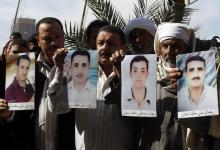
Pope Francis on Feb. 16 denounced the brutal slayings of 21 Coptic Christians in Libya by militants linked to the Islamic State, saying “they were assassinated just for being Christian.”
“The blood of our Christian brothers is a witness that cries out,” Francis said in off-the-cuff remarks during an audience with an ecumenical delegation from the Church of Scotland.
The pope, switching to his native Spanish, noted that those killed only said “Jesus help me.”
“Be they Catholic, Orthodox, Copts, Lutherans, it doesn’t matter: They’re Christian! The blood is the same: It is the blood which confesses Christ,” Francis said.
He said their deaths bore witness to “an ecumenism of blood” that should unite Christians, a phrase he has used repeatedly as the Islamic State continues its bloody march.
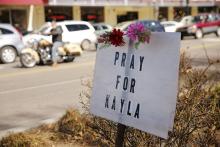
The risk of foreign aid work, especially for young people, has again been thrust into the national spotlight after the death of 26-year-old Kayla Mueller.
Mueller, a foreign aid worker, was confirmed dead Feb. 10 after being taken hostage by Islamic extremists in 2013 in Syria.
Even as aid organizations have improved security protocols over the past several years, workers can be placed in war-torn areas where safety cannot be guaranteed, said Abby Stoddard of Humanitarian Outcomes, a research and policy group for humanitarian agencies.
And those who feel compelled to take part in easing human suffering abroad may put safety second.
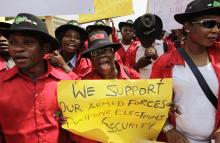
Nigeria’s election commission has postponed national elections for six weeks saying it would not be able to provide security for voters in the northeast region of the country most affected by the Islamist group Boko Haram.
Attahiru Jega, head of the Independent National Electoral Commission, announced Feb. 7 that the elections scheduled for Feb. 14 had been moved to March 28. Nigeria is slated to elect a president for a four-year term. Goodluck Jonathan, the current president and a Christian, is running for re-election alongside 13 other candidates, including his most formidable challenger, Muhammadu Buhari, a Muslim.
Jonathan has been sharply criticized for his management of the Boko Haram crisis and some Western leaders suggested the postponement was a last-ditch effort to shore up his vote.
But church leaders in the war-hit regions welcomed the move.
“Many Christians here had not collected their voter cards and this may afford them time to do so,” said the Rev. John Bakeni, the secretary of the Roman Catholic Diocese of Maiduguri.
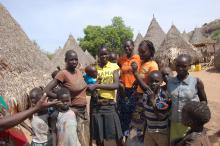
As world attention shifts to the growing influence of Muslim militant groups on the African continent, few have paid any attention to the ongoing bloody conflict in South Sudan.
An estimated 50,000 people have died and 2 million have been displaced in the latest phase of fighting in this nation, according to the International Crisis Group, a think tank that aims to prevent and resolve such conflicts. That’s about five times more than in northern Nigeria, where the Islamist militant group Boko Haram has killed more than 5,000 people in six years.
“South Sudan’s conflict is not getting much attention due to shifting interests towards Islamic extremism,” said the Rev. Fred Nyabera of Kenya, a social scientist who is director of the Interfaith Initiative to End Child Poverty at the global faith-based organization Arigatou International. “This has become a global issue because of the immediate threats it poses to nations.
“But leaving South Sudan alone at this time when the people are trying to define their identity and country, under very fragile circumstances, is to postpone a big problem,” Nyabera added.
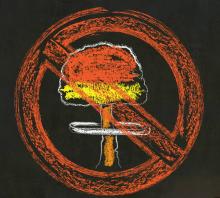
IMAGINE IF YOU will a world in which the most destructive weapons were “conventional” explosives. These bombs, often with nicknames such as “Daisy Cutter” or “bunker buster” or even the “Mother of All Bombs,” have enormous power: The Vietnam-era Daisy Cutter, one of the largest conventional weapons ever used, was designed to flatten a forest into a helicopter landing zone with a blast equal to about 15,000 pounds of TNT.
Now imagine that someone says, “Those conventional bombs aren’t destructive enough. Let’s invent a weapon a million times more powerful, one that releases radiation that magnifies the killing effects for generations. And let’s make 16,000 of those weapons.”
A sane world would respond, “You’ve gotta be kidding.”
But in the real world, it’s no joke.
Today, 70 years after the attacks on Hiroshima and Nagasaki in 1945, the world has 16,400 nuclear weapons—93 percent of them in the arsenals of the U.S. and Russia. The first H-bomb had the force of around 10 million tons of TNT, more than a million times as powerful as the worst conventional weapons.
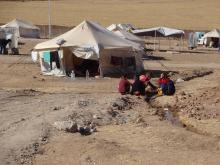
REV. KHALIL JAAR is a warm, passionate, and energetic man—and he needs to be. As the spiritual leader and “go to” guy for the 150 Iraqi Christian refugees living in his church in Amman, Jordan, he needs all the energy he can get.
When I met with Father Jaar at St. Mary, Mother of the Church congregation in Amman, it quickly became obvious how much he loves the refugees who now call this church home. Jaar, himself a refugee, knows something about the trials and tribulations of being forced to leave your home. He is the son of Palestinian refugees of Honduran descent. (His birth name is Carlos and he took the name Khalil when he became a Catholic priest.) He also knows something about the terror of war. Shortly after the 2003 U.S. invasion of Iraq, he was abducted in Baghdad where he was serving, and “only by the grace of God was I freed,” he says.
Jaar is especially dedicated to the education of the Iraqi children forced to leave everything they knew, including their schools. In his overcrowded office, full of stacks of papers and files, Jaar pulls out a large binder. This is his personal reference book, with a page for each child in his care. It includes a photo, a short history of their family and background, their education to date, and also notes about their extracurricular activities and likes, such as soccer and music. It is important to know as much as possible about each child, he says, and make sure that they continue their education.
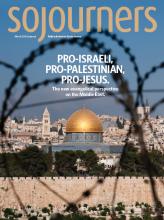
One of the barriers to a just peace in the Middle East has been the one-sided stance of some evangelical Christians in the United States. Many conservative Christians have been uncritical of even the most repressive Israeli policies and political opponents of a responsible two-state solution. But this seems to be changing.

In 2014, the Inter-American Development Bank (IDB) premiered Water Everlasting? The Battle to Secure Haiti’s Most Essential Resource, a documentary film addressing concerns about Haiti’s public water system.
Government agencies and charitable organizations have spent decades attempting to provide clean water to Haiti, but administrative weaknesses often impede these efforts. The 2010 earthquake exacerbated the problem. Suddenly, millions of people lacked access to safe drinking water, and waterborne diseases reached epic proportions.
Yet, despite the many instances of lack, there is good being done in Haiti in various capacities. Read “On a Firm Foundation” to learn of the many positive accomplishments of Haitians working in their own neighborhoods.
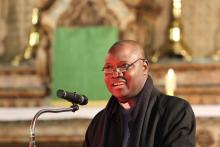
Nigerian Roman Catholic Archbishop Ignatius Kaigama says his country needs a similar march to the one held in Paris on Jan. 11 to pay tribute to victims of Islamist militant attacks.
While 20 people were killed in the Paris rampage (including three terrorists), Boko Haram’s ongoing campaign of terror in Nigeria has left hundreds dead. Last week, as many as 2,000 were killed as Boko Haram militants took over the town of Baga in Borno state.
Kaigama said he wants the international community to show determination to stop the advance of militants, who are indiscriminately killing Christians and Muslims and bombing villages, towns, churches, and mosques.
“I hope even here a great demonstration of national unity will take place, to say no to the violence and find a solution to the problems plaguing Nigeria,” Kaigama told Fides, a Catholic news agency.
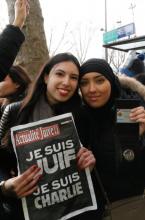
As France emerges from its worst terrorist attack in decades, a biting novel that imagines the country governed by Islamic law is part of a swirling debate about its basic values. Will the country respond to the shootings with fear and xenophobia, as suggested by the book “Soumission,” or “Submission” — or embrace its multicultural, multifaith identity?
On Jan. 11, solidarity was on display as heads of state and religious leaders joined millions on the streets of Paris in a massive march for free expression and to honor last week’s victims from the satirical magazine Charlie Hebdo.
Along with “I am Charlie,” some protesters also chanted “I am Jewish” in tribute to the four men gunned down by one of the assailants at a kosher market.
Muslims carried signs saying, “I am Charlie and Muslim.” And on Twitter, thousands of French rallied behind “#JeSuisAhmed” — referring to policeman Ahmed Merabet, a Muslim, who also died in the attack on the magazine.
On the edge of the dense crowd, high school student Amina Tadjouri clasped a Jewish newspaper, as she stood next to a Muslim cleric railing against radical Islam.
“I’m Muslim, and I’m not OK with these killings,” she said.
Five years after the 7.0 magnitude earthquake that devastated Haiti on Jan.12, 2010, killing hundreds of thousands of people, Haitians are still working to rebuild the poorest country in the hemisphere.
In August, Sojourners Editor Jim Rice traveled to Haiti to meet with nonprofits, ministries, and residents. His reports from the trip became the cover story for Sojourners' February issue. For the week of Jan. 12 only, we've released the story from our paywall. Go here to read for FREE.
See the slideshow of photos from the trip at the jump.
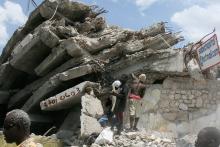
On this 5th anniversary of the earthquake, I remember four-story buildings collapsed into a stack of concrete pancakes. I remember circling over Port-au-Prince in a small plane with other relief personnel six days after the earthquake, finally able to get there. I remember bodies being pulled from rubble. I remember how it seemed to take so long for rebuilding to start. People responded generously around the world, though the overall impact has been hard to track. It has been encouraging to see building and infrastructure progress the past couple of years. Still, the big picture can make my faith and hope go a bit wobbly.
It’s when I think of people — and when I start reflecting on the earthquake, people come first to mind — that the sadness comes on stronger, but so does the reason for faith and hope.

Archbishop Oscar Romero, the hero of the Catholic left who was assassinated in 1980 while celebrating Mass in El Salvador, is inching one step closer to sainthood after his case languished in bureaucratic limbo for decades.
According to the Italian Catholic bishops daily, Avvenire, a panel of theologians at the Congregation for the Causes of Saints has ruled unanimously that Romero should be considered a martyr, or murdered “in odium fidei” (Latin for “hatred of faith”).
The paper reported the ruling was made on Jan. 7. The move is considered a decisive step on Romero’s path to sainthood.
Romero, the archbishop of San Salvador, was shot dead by right-wing death squads while celebrating Mass in March 1980. His murder came a day after he delivered a homily calling for soldiers to lay down their guns and end government repression in the country’s bloody civil war.
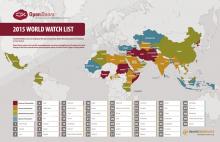
From imprisonment to torture to beheadings, more Christians worldwide live in fear for their lives than at any time in the modern era.
That’s the message from Open Doors USA, which released its annual World Watch List on Jan. 7. Christian persecution reached historic levels in 2014, with approximately 100 million Christians around the world facing possible dire consequences for merely practicing their religion, according to the report. If current trends persist, many believe 2015 could be even worse.
“In regions where Christians are being persecuted as central targets, the trends and issues we track are expanding,” said David Curry, president of Open Doors, a nonprofit that aids persecuted Christians in the most oppressive countries and ranks nations based on the severity of persecution.
North Korea tops Open Doors’ list as the worst oppressor of Christians for the 13th consecutive year, but the list is dominated by African and Middle Eastern nations. Iraq, which experienced the mass displacement of Christians from its northern region, ranked third. Syria was listed fourth, due to the reign of ISIS in that war-torn region. Nigeria ranked 10th, due in part to the more than 1,000 Christians murdered or kidnapped by terrorist groups such as Boko Haram. Also included in the top 10 are Somalia, Afghanistan, Sudan, Iran, Pakistan, and Eritrea.
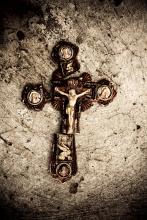
SINCE WAR BROKE out in the Central African Republic in March 2013, the international community has referred to it as a “religious conflict.” When the media cover the violence at all, they usually frame it as a story of Muslims against Christians. However, to call this conflict a war of religion is simplistic at best and a smokescreen for the real causes at worst.
That is the message that Central African Republic (CAR) faith leaders—Catholic, evangelical, and Muslim—have worked tirelessly to spread, at great personal cost. Imam Omar Kobine Layama, president of the Central African Islamic Community, Catholic Archbishop Dieudonné Nzapalainga of Bangui, and Rev. Nicolas Guérékoyame-Gbangou, president of the Evangelical Alliance of the Central African Republic, have been at the forefront of their country’s peace and reconciliation movement.
During a November 2014 interview in Washington, D.C., Archbishop Nzapalainga adamantly refuted the “religious war” narrative.
“Our role is to continually remind our religious believers ... that those people who want to kill people or rape people ... are in contradiction with their faith,” he told Sojourners. “We, for example, have never been telling our believers that they should go out and kill Muslims, and the imam has never been telling his followers that they should go out and kill Christians.”
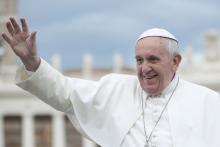
Pope Francis reinforced his radical reshaping of the Catholic Church by naming 20 new cardinals from countries as far afield as Ethiopia, Tonga, Thailand, and Panama.
The clerics – who come from 18 different countries – include 15 who are eligible to vote for the pope’s successor in a future conclave, and five retired bishops and archbishops “distinguished for their pastoral charity” who are over age 80 and ineligible to select the next pontiff.
Dissatisfied with the slow pace of change in Rome, Francis’ appointments reflect his desire for “pastors on the front line of difficult situations,” one Vatican observer said, who can bring a new perspective from the often overlooked outposts of global Christianity.
The Vatican’s chief spokesman, the Rev. Federico Lombardi, said the choices showed the pope’s most important criteria was “universality,” and indicated he was not “chained to tradition” as he moves the balance of power at the highest levels of the church closer to the developing world.
It is the first time ever that cardinals have been selected from Tonga, Myanmar, and Cape Verde to become “princes of the church.” There are only five Europeans included among the 15 new electors – two from Italy and three others from Corsica, Spain, and Portugal. The United States was shut out for the second time in a row.